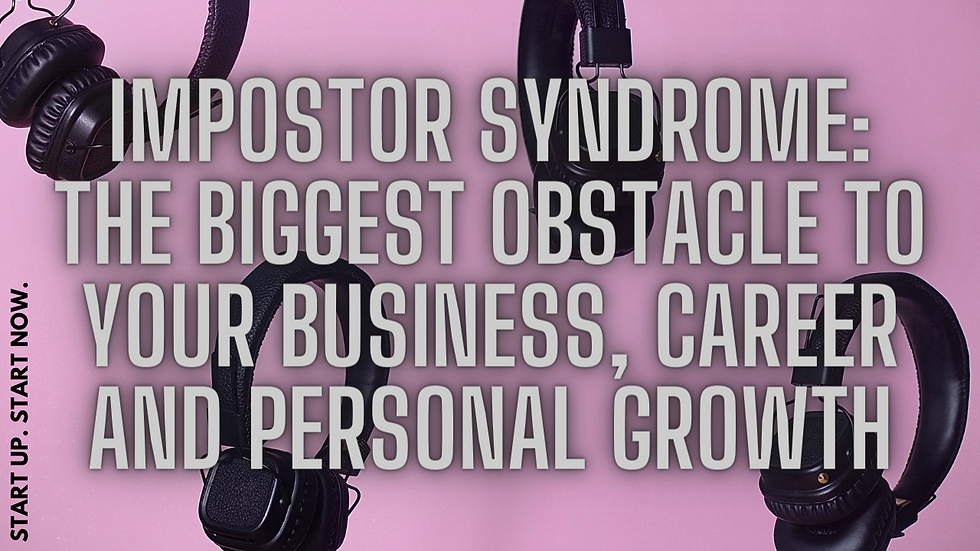- Anita Gill

- Feb 10, 2021
- 4 min read
Impostor Syndrome – we’ve heard the phrase countless times, yet it remains in the back of our minds in times of success and failure alike. While you may know what it means, have you truly taken the time out of your day to figure out exactly how you can tackle it?

For those who aren’t aware of the true meaning of the phrase, Impostor Syndrome is likely something you have experienced. It’s that little voice in the back of your mind that pounces at the chance to tell you that you’re not quite good enough, that you don’t know enough or that you can’t truly be successful despite working hard towards it. It’s the internalised fear of failing and of other people ‘realising’ that you’re not fit for your position or deserving of your accomplishments.
Ultimately, this voice in your head is you, and so only you can be in a position to face it. Rather than eradicating it completely, Impostor Syndrome should be acknowledged as something we all face in our business, career and personal life, with open conversation normalising discussion around how exactly we can quiet that voice of self-doubt, and amplify our self-believing one.

Recognise the Signs; The first step to facing your Impostor Syndrome, is probably to recognise that it’s there in the first place. Surprisingly, this can be quite difficult to notice as we become accustomed it, but there are definitely ways you can go about increasing your awareness of its presence. Some clear examples of Impostor Syndrome can be identified with asking yourself simple questions like, are you making excuses for your achievements? Do you catch yourself trying to find other reasons behind your success other than your hard work and talent? Do you often think you’re not deserving or competent enough for roles that you’d otherwise apply for? From these types of questions, we can become conscious of the presence of Impostor Syndrome in our lives, and find the means to tackle it head-on.

Acknowledge Your Success; Ensuring you are actively acknowledging your success and the true reasons behind it are essential to quieting the nagging voice of Impostor Syndrome. While being conscious of your achievements is inherently a pattern of thought, writing them down can really help to visualise this thought process and contribute to that self-belief that can only propel you to further success and gratitude. So write it down – everything! Jot down those achievements and strides you’ve taken in life that you haven’t quite taken the time to internalise and commend yourself for.
An important thing to remember here, however, is to not only focus on recognising and writing down specific accomplishments, but also the process towards getting there. Achievements are not only prominent in whether you got one specific job or not, passed or failed a particular exam, or reached or fell short of a milestone you’d set for yourself. While you should applaud yourself for such achievements, try to internalise what it took to get there; hard work, upskilling, learning, becoming more organised etc. These are all things to include along with your list of achievements and are, essentially, achievements in themselves. By ensuring that you're focusing on how you have developed as an individual as a result of accomplishments or in the journey towards them, you can ensure you maintain a self-growth focused mindset. Moreover, you can avoid encouraging your perception of self-worth to become reliant on things like whether you got that one job, or whether you got X amount of marks on a test. Focus on making your confident consistent – through times of achievement and failure alike.

Say YES; to new opportunities! Stop feeding into the mindset of rejecting an opportunity that fits your personal criteria, that you would love to do and would be valuable to your own growth simply because you don’t feel you meet 100% of the job description. The fact is, the majority of people applying to jobs likely won’t fit each and every specified preference, or be an expert at every single part of the role description. So, while you are sat there accepting the voice of Impostor Syndrome and forgetting to acknowledge your ability to adapt, others are sat at their desks, typing away and submitting applications to their dream roles, while you may well be just as or more qualified.
Making a habit of applying to opportunities and roles like these will ensure you are committed to that self-growth and self-belief mindset we talked about. More importantly, it ensures you are not missing out on what could be opportunities of a lifetime simply because you gave into that persistently pessimistic voice that wrongly convinced you that you’re not good enough.

Spending so much time with our own thoughts, particularly with the current situation, it is all the more vital for us to be mindful of the way we treat ourselves in times of stress, success and hardship. By using the tips and tricks we’ve put together, you can progress your journey towards turning your back on Impostor Syndrome, and turning towards a landscape of opportunities and career progression waiting for you!
Once you’ve implemented the tips from us above, head over to Spotify, Apple, or Google Podcasts to tune in to some ‘Start Up. Start Now.’ Podcast episodes bringing you motivation from British entrepreneurs. Our personal recommendation to help tackle your impostor syndrome and find some much needed inspiration is episode 9 with Dr Heather Melville OBE!
Join the conversation using #startupstartnow and tagging us on Instagram, Twitter, Facebook and LinkedIn.
Don't forget to leave a review as it really helps reach those who need it and allows us to get the best guests for you!
.png)



